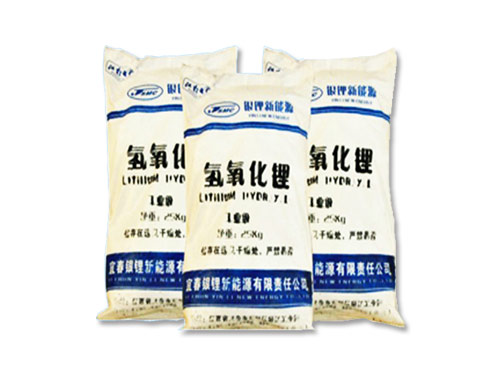標(biāo)題內(nèi)容

Physical Properties
| CAS No.: | 1310-66-3 | Molecular formula: | LiOH |
| Surface view: | White crystalline powder | Melting point: | 471℃ |
| Density: | 1.51g/cm3 | Characteristics: | soluble in water, slightly soluble in ethanol, insoluble in ether |
Quality Standards:GB/T8766-2002
| Name | Lithium Hydroxide | ||||
| Grade | LiOH·H2O-T1 | LiOH·H2O-T2 | LiOH·H2O-1 | LiOH·H2O-2 | |
| LiOH content not less than(%) | 56.5 | 56.5 | 56.5 | 56.5 | |
| Impurity content not greater than(%) | Na | 0.002 | 0.008 | 0.15 | 0.20 |
| K | 0.001 | 0.002 | |||
| Fe2O3 | 0.001 | 0.001 | 0.002 | 0.003 | |
| CaO | 0.02 | 0.03 | 0.035 | 0.035 | |
| CO2 | 0.35 | 0.35 | 0.50 | 0.50 | |
| SO42- | 0.01 | 0.015 | 0.02 | 0.03 | |
| Cl- | 0.002 | 0.002 | 0.002 | 0.005 | |
| hydrochloric acid insoluble matter | 0.002 | 0.005 | 0.01 | 0.01 | |
| water insoluble matter | 0.003 | 0.01 | 0.02 | 0.03 | |
Application Scope
Lithium hydroxide is mainly used in the preparation of lithium-ion battery cathode material, and it can also be used as an additive in the electrolyte of alkaline battery, which can increase the electric capacity by 12%~15% and improve the service life by 2~3 times.
Storage and use: The product is extremely corrosive, can burn the eyes, skin and upper respiratory tract, oral corrosion of the digestive tract, can cause death; inhalation can cause laryngeal, bronchial inflammation, spasm, chemical pneumonia, pulmonary edema, etc., closed operation, provide adequate local exhaust air. Operators wear dust masks, rubber acid and alkali resistant clothing and rubber acid and alkali resistant gloves to avoid dust generation and contact with oxidizers, acids and carbon dioxide; store in dry and clean warehouses. Keep away from fire and heat sources, prevent direct sunlight, store separately from oxidizers, acids, carbon dioxide and edible chemicals, and remember to mix storage.
Package: Paper-plastic composite bag lined with 2 layers PE bag, 25KG/pack or as agreed by the supplier and the buyer.
Transportation: prohibited by mail, limited by air, dangerous chemicals by sea UN#:2680, dangerous chemicals by rail UN#:8.41b, dangerous chemicals by road UN#:8.41b.